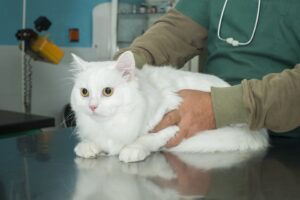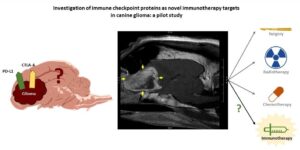Our current research in cancer
Explore more PetSavers-funded research in other disease areas
|
|
Exploring the role of cancer stem cells in feline injection-site sarcomas: active metabolic pathways and therapy responsesStudent Research Project Grant: £1,400 awarded in 2025 Institution: University of Edinburgh Lead researcher: Lisa Pang Student: Michelle Lai The hypothesis is that feline infection site sarcoma (FISS) are maintained by a population of cancer stem cells that continuously drive tumour growth and contributes to treatment failure, and these cells upregulate particular metabolic pathways to sustain the tumour niche. Aim: By identifying these characteristics of FISS cancer cells, there is the potential to select drugs that target these proteins or metabolic pathways. |
|
|
Investigation of immune checkpoint proteins and novel immunotherapy targets in canine glioma: a pilot studyStudent Research Project Grant: £2,400 awarded in 2025 Institution: RVC Lead researcher: Andy Yale Student: Sunita Garg Novel treatment strategies beyond surgery, radiation therapy and chemotherapy are desperately needed for canine glioma as outcomes have remained stagnant over the last decade. Aim: To investigate the expression of immune checkpoint proteins as possible immunotherapy targets in canine glioma. |
|
|
CD44 expression in feline cholangiocarcinoma: A potential therapeutic target?Student Research Project Grant: £3,200 awarded in 2025 Institution: RVC Lead researcher: Alejandro Suárez-Bonnet Student: Kathy Mu Currently, cholangiocarcinoma in cats carries a poor prognosis since diagnosis normally occurs once the cancer has spread within the liver or even to other organs. If diagnosed at an earlier stage, surgery to remove the primary tumour is the only treatment available, but cannot guarantee complete remission of the tumour. Aim: Using retrospective formalin-fixed paraffin-embedded tissue samples from the pathology archive at the Royal Veterinary College, this study aims to reveal the expression of oncoprotein CD44 that is used as therapeutic targets in human cholangiocarcinomas, in feline cholangiocarcinomas. |
|
|
Flow cytometric analysis of Ki-67 expression in canine cutaneous mast cell tumours and its prognostic valueClinical Research Project Grant: £18,860.97 awarded in 2023 Institution: University of Cambridge Lead researcher: Petros Odatzoglou Currently, the predicted clinical outcome of mast cell tumours is based on histopathologic grading during invasive surgery, and evaluating the spread of disease (staging). Aim: This study will use flow cytometry to estimate Ki-67 expression as a prognostic marker of mast cell tumours. The outcome could change the way tumour staging and grading are undertaken before surgery or invasive treatment is performed which could help guide timely treatment decisions. |
|
|
Beta-adrenergic receptor expression in canine haemangiosarcomas – search for a new potential therapeutic interventionClinical Research Project Grant: £7830 awarded in 2020 Institution: University of Nottingham Lead researcher: Ana Ortiz Canine haemangiosarcomas are malignant vascular tumours with a typically poor prognosis due to their poor response to conventional therapy and high metastatic rate. The median survival time for dogs with certain forms of haemangiosarcomas is only 8 months using current therapeutic approaches of chemotherapy and surgical excision. Aim: Treatment for human malignant vascular tumours with β-adrenergic receptor antagonists has greatly improved survival rates, so this study is exploring the expression of these receptors in canine haemangiosarcomas to see if they can be a therapeutic target. It therefore aims to be a platform study for the use of β-blockers in combination with chemotherapy for the treatment of canine visceral haemangiosarcoma. An article about the study was published in BSAVA’s Companion magazine. |
Our past research in cancer
|
|
Evaluation of plasma and urinary nucleosomes in dogs with urothelial carcinomaStudent Research Project Grant: £3,200 awarded in 2023 Institution: University of Cambridge Lead researcher: Tim Williams Student: Ollie Bardsley Urothelial carcinoma (bladder cancer) is the most common neoplasm of the lower urinary tract and accounts for 2% of all canine malignancies. It can be challenging to diagnose as its clinical signs closely mimic those of urinary tract infections, and no neoplasia-specific changes are typically observed on routine haematology, biochemistry, or plain radiography. Hence, diagnosis typically requires abdominal ultrasound plus the collection of cells/tissue by suction biopsy, which requires general anaesthesia and possible referral of a specialist centre. Take home message: Serum nucleosomes (small fragments of chromosomes released into the blood during cell death or white blood cell activation in inflammation) were not found to be a useful biomarker to identify dogs with urothelial carcinoma, and the freeze-thaw process had a notable effect on nucleosome concentrations. Ollie presented these findings as an abstract at BSAVA Congress 2025, which can be read here. A recording is freely available (skip to 0:12:10). |
|
|
Feline lymphoma of the nervous system: a retrospective study (2003-2018)Student Research Project Grant: £1600 awarded in 2020 Institution: RVC Lead researcher: Elsa Beltran Student: Alex Davies This undergraduate project assessed the relative frequency of different forms of feline lymphoma, especially those involving the nervous system, and reviewed their clinical features and diagnostic findings. A total of 250 cats were included in the study with a median age of 9.7 years. Anatomical locations of lymphoma included alimentary (55.7%), hepatic (14.5%), splenic (9.4%), mediastinal (10.6%), nasal (8.2%), cutaneous (2.4%), multicentric (19.6%), renal (14.5%%) and nervous system (9.4%). Cats with nervous system lymphoma presented with chronic (79.2%), progressive (100%), lateralised (58.3%) and non-painful (58.3%) neurological deficits. The lesions affecting the nervous system were seen with advanced imaging in seventeen cats. Alimentary lymphoma (32.2%) and renal lymphoma (25.8%) were most frequently seen in cats with neurological deficits. Take home message: Although nervous system lymphoma is relatively infrequent compared with alimentary, mediastinal, multicentric and cutaneous forms, it should be considered when compatible clinical signs are present. Alex was interviewed for our Meet the Researcher series which can be read here. He presented his research findings as an abstract at BSAVA Congress 2021, and a recording is freely available (skip to 3:42:33). Watch it here |







